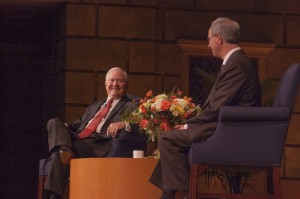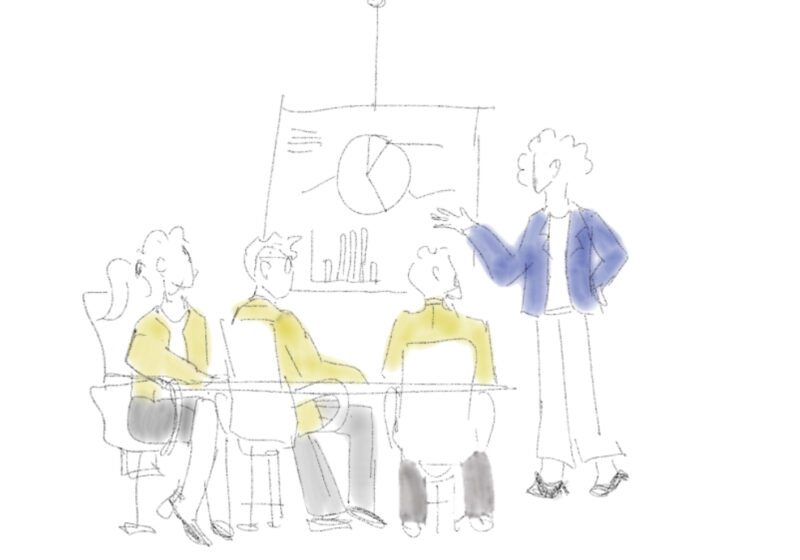Secretary of Defense and CIA Director Robert Gates delivered this year’s Meliora Weekend address on Saturday, Oct. 12 in Kodak Hall. Topics discussed included the federal government shutdown, Gates’ tenure in Washington, and his thoughts on the challenges facing national security.
“This morning I’d like to go beyond the daily headlines and share some thoughts about pressing security challenges facing the United States, including some key countries and regions overseas,” Gates said after a brief introduction. “[These] areas are important to our national security for sure, but also have a significant effect on our economy. Then I’ll close with some thoughts about another global trouble spot: Washington D.C.”
His subsequent speech was delivered with a balanced mix of candor, levity, and sincerity.
The setting and context in which he gave his speech was not lost on him, having previously served as president of Texas A&M University and currently serving as chancellor of the College of William & Mary.
“Returning to a campus is a reminder of what so struck and moved me when I went from being a university president to being Secretary of Defense in a time of war,” Gates said. “I would see thousands of students between the ages of 18 and 25 wearing flip flops, backpacks, and shorts. After becoming Secretary of Defense, I would often visit our troops in Afghanistan and Iraq and was always struck by the fact that most of them were exactly the same age as the students I had seen at Texas A&M, except these 18 to 25-year-olds were wearing body armor and carrying assault rifles.”
The contrast was a fitting introduction to a discussion of conflicts that, ultimately, have human life behind them.
The first defense topic Gates tackled was terrorism.
“We can no more eliminate terrorism altogether than we can eliminate crime,” Gates said. “To expect perfection is unrealistic, especially in a free and open country. We must pursue vigorous measures to protect people…but without sacrificing our rights and our privacy.”
He then provided commentary on security challenges with China, Iran, and the Middle East.
The Chinese government, he contends, is characterized by “paranoia and hypersensitivity to the smallest criticism or national challenge” and lacks “the legitimacy that comes from demo cratic freedoms.” He was also critical of China’s inaction in improving relations with North Korea.
He was equally blunt in his comments on Iran: “We should harbor no illusions about the regime we’re dealing with,” he said. He went on to say that any attack on Iran by another world power “would make a nuclear arms run inevitable.”
In a general commentary on the Middle East, Gates cautioned against swift regime change and emphasized the need to keep United States security interests in mind when considering intervention.
“As Defense Secretary I opposed the government’s decision to intervene militarily in Libya,” he said. “It didn’t pose an immediate threat to US security.”
He also stated his opposition toward military intervention in Syria, which he said must be seen in the context of a civil war, regardless of the use of chemical weapons. Any support should be “indirect,” and “limited to indirect support for certain elements of the opposition, working with regional players to help with supplies, intelligence, and some basic military equipment.”
He followed with his rationale: “In the West we tend to overestimate our ability to shape, much less determine outcomes, in this part of the world.”
In the last portion of the speech, he spoke about the “final problem country,” the United States. Gates criticized the increasing partisanship and disappearance of “bridge-builders” in Congress.
“Much of the dysfunction comes down to an unwillingness to put aside short-term partisan gain and ideological purity for long-term benefit of the country, and above all, an unwillingness to compromise,” he said. “My hope…is that the remaining adults in the two political parties will make the compromises necessary to end the shutdown, raise the debt ceiling, and put this country’s finances back in order.”
In conclusion, Gates expressed his faith in the nation, acknowledging that the biggest struggles are the ones faced within the nation, not outside it.
“Whether the United States sustains our global income, political and economic preeminence depend not on what happens abroad… but on what we choose do: the compromises we forge, the sacrifices we make and the dignity and courage within us.”
Remus is a member of the class of 2016.






